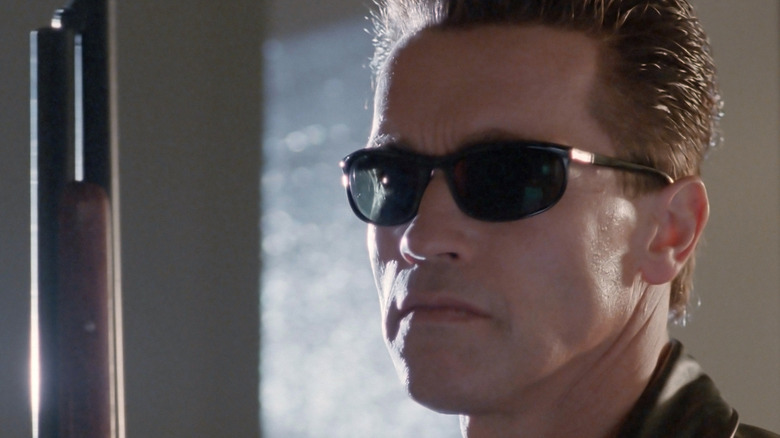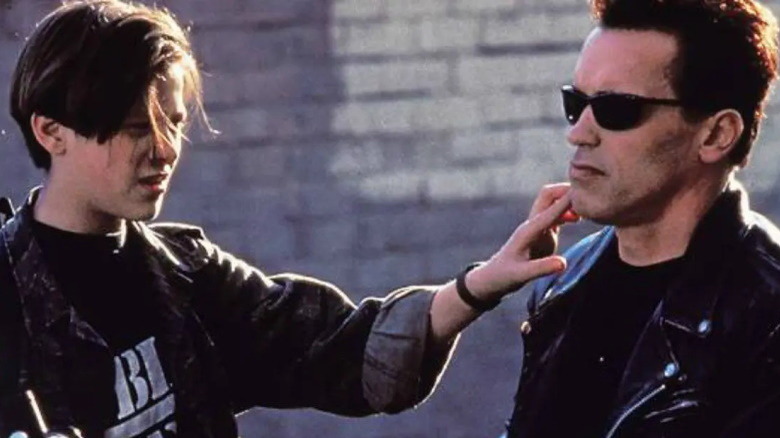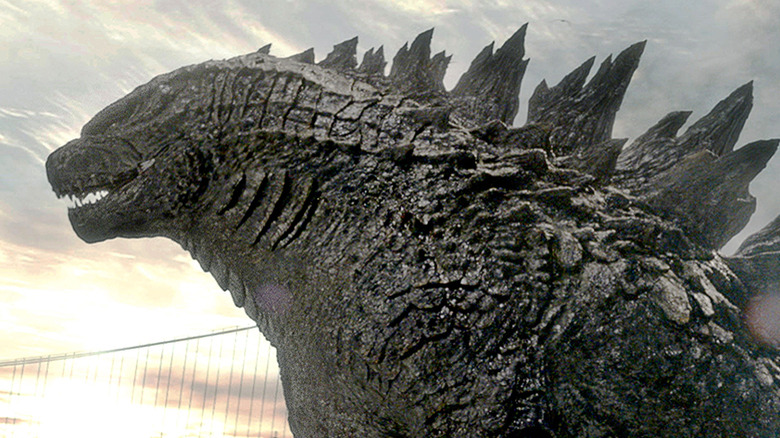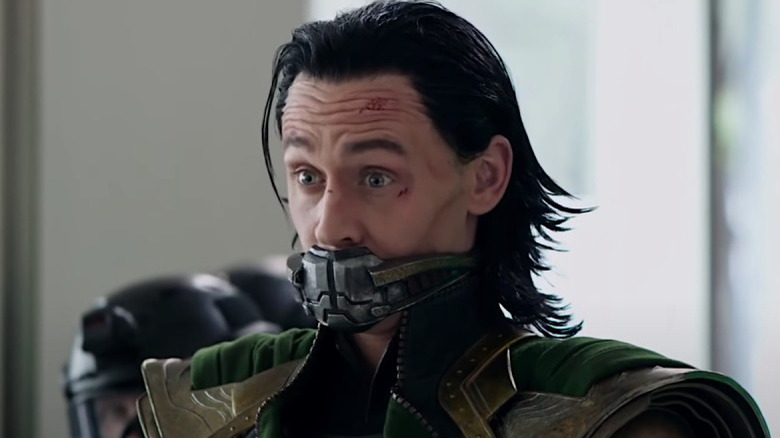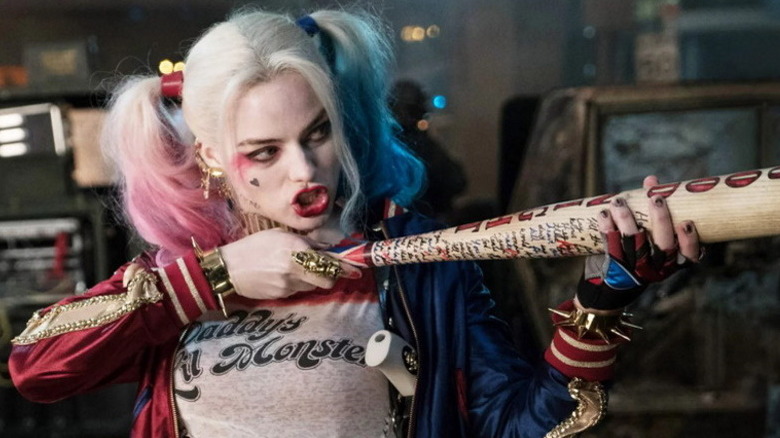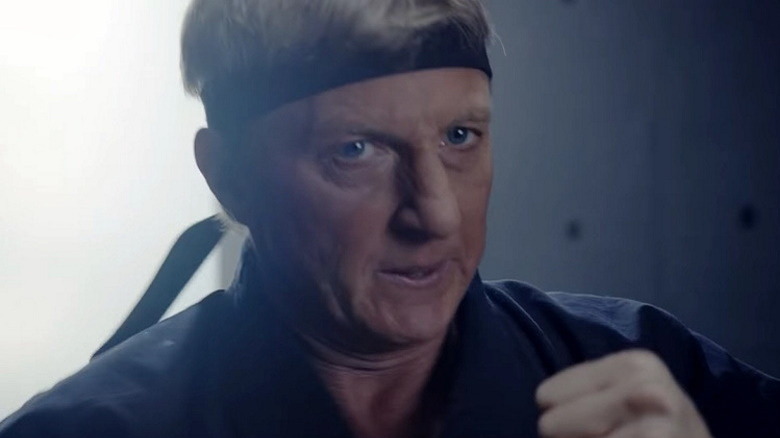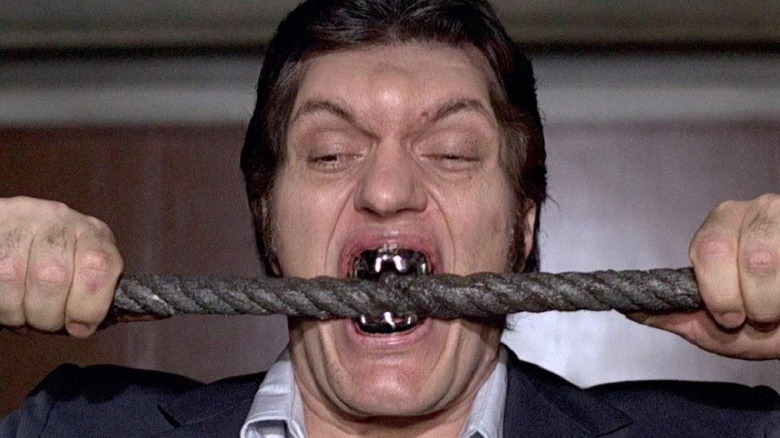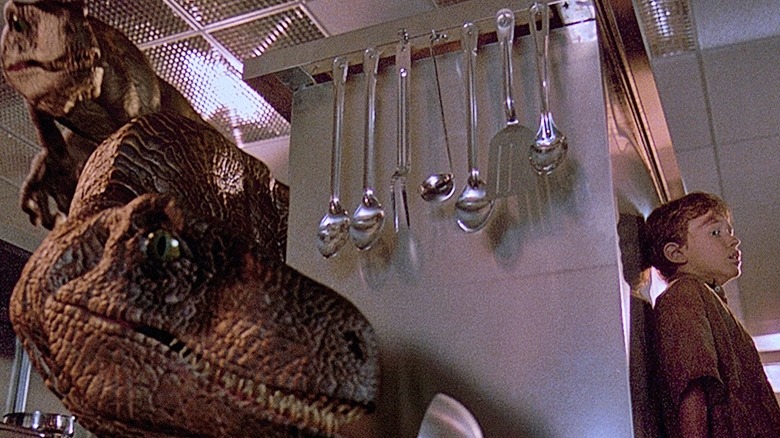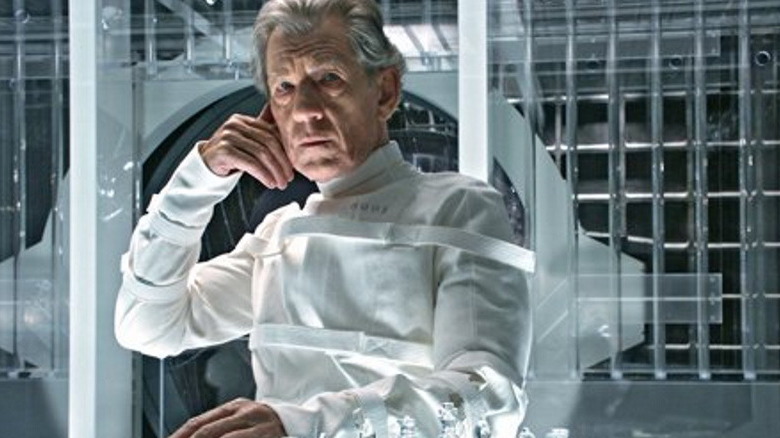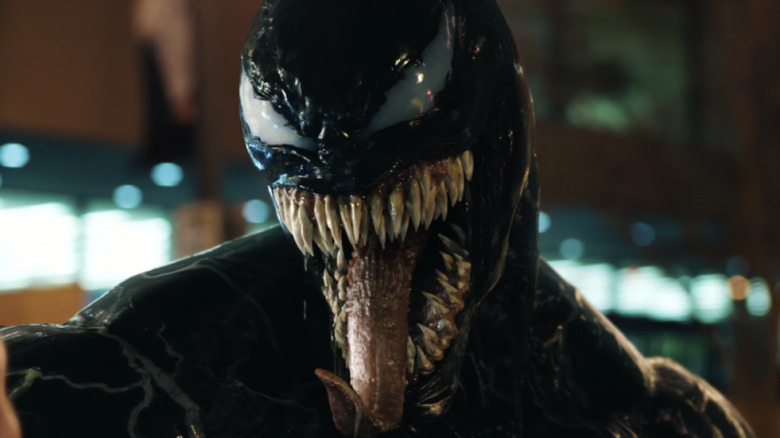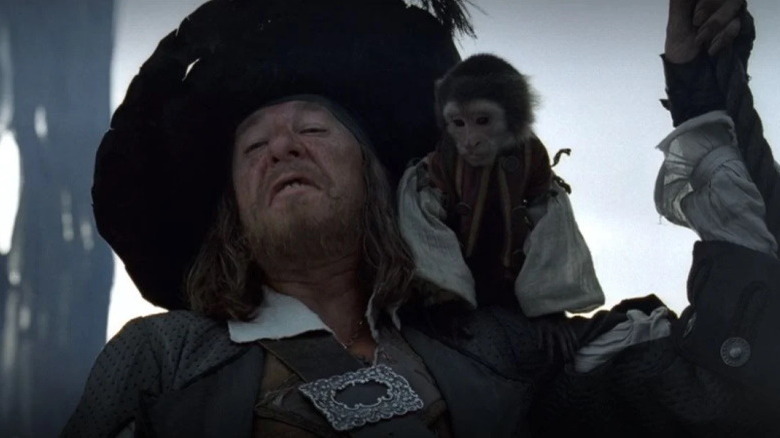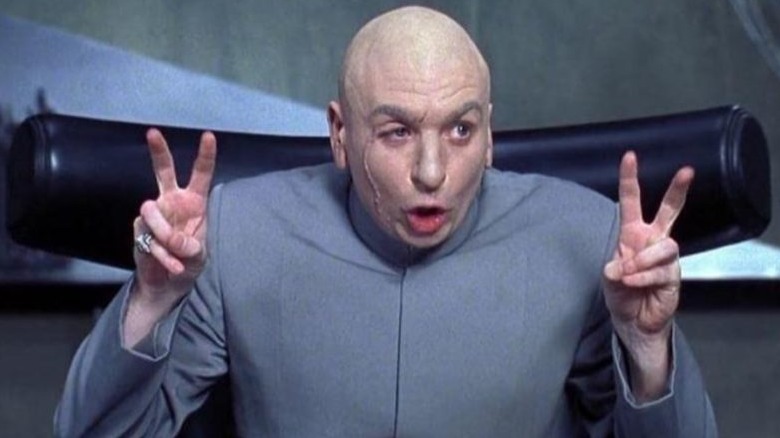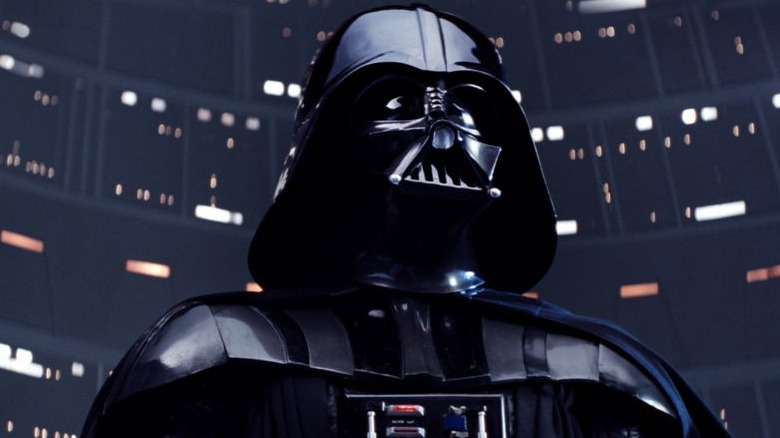Movie Villains Who Became Heroes
"You either die a hero or you live long enough to see yourself become the villain."
This iconic quote from Harvey Dent (Aaron Eckhart) in "The Dark Knight" (2008) illustrates the tragic path taken by even the most iconic heroes who find themselves being corrupted by the very evil they try to fight. It's a path taken by "The Lord of the Rings" wizard Saruman the White, Jean Grey in the "X-Men" film franchise, and Dent himself in "The Dark Knight" when he succumbs to his darker impulses and becomes the homicidal Two-Face.
Sometimes, however, the opposite is true and a villain can forge a surprising redemptive arc over the course of multiple movies. The motivations for this vary, ranging from reprogramming, gradual epiphanies, or just the lure of big box office receipts from turning a popular villain into an even more bankable anti-hero. In the end, the heroically villainous characters below prove that sometimes bad guys truly are the best good guys.
The Terminator
Arnold Schwarzenegger embodied one of cinema's most relentless villains in 1984's "The Terminator." After director James Cameron decided O.J. Simpson, his original choice for the cybernetic organism, wasn't believable as a killing machine, Schwarzenegger stepped up and provided his own brutal depiction of the Terminator. Even today, the scene of Schwarzenegger's T-800 gunning down everyone in a police station ranks among the most iconic scenes in movie history.
So, it came as a shock when Schwarzenegger returned to the role in 1991's "Terminator 2: Judgement Day" as a heroic cyborg charged with protecting John Connor (Edward Furlong), the child his predecessor had been trying to kill in the original movie. Although trailers spoiled the twist for many audiences, the idea that a human-killing Terminator could be reprogrammed into a guardian for mankind was an inspired one — and influenced all later depictions of Schwarzenegger's Terminator.
Granted, the T-800 in "Terminator 2" isn't the original Terminator, but an identical model. However, the fact that he was originally designed to kill humans does make him a potential villain who became a hero. Moreover, the heroic Terminator of "Terminator 3: Rise of the Machines" (2003) actually killed John Connor in the future before being reprogrammed to protect him in the past. Likewise, the Terminator in "Terminator: Dark Fate" (2019) suffers a relapse when he murders a teenage John Connor, but later finds redemption by raising a family and starting a curtain business.
Godzilla
He might be the King of Monsters, but Godzilla has also been humanity's savior for almost seventy years. Whenever giant kaiju monsters emerge from the sea or descend from space, you can always count on Godzilla to take them down with his massive strength and radioactive breath.
Except ... this wasn't Godzilla's original purpose or role. In the first movie, "Godzilla: King of the Monsters!" (1954), Godzilla was a living metaphor of nuclear war — a giant radioactive dinosaur who threatened Japan with total destruction until an experimental "Oxygen Destroyer" managed to disintegrate him into a lifeless skeleton.
Over time, however, Godzilla has evolved. He returned in multiple movies to battle other giant monsters and protect humanity — initially reluctant, but later with more enthusiasm. Subsequent reboots did try to revert him back to his original antagonistic role while also establishing him as a force of nature that could threaten as many humans as he saved, but by this point his heroic role had become inherent in the character. By the time he reappeared in the recent "Monsterverse" reboot movies, audiences had accepted that Godzilla was a heroic monster they could cheer on ... albeit from a safe distance.
Loki
While some of the early Marvel Cinematic Universe films were criticized for offering lackluster supervillains, this was not the case with Loki (Tom Hiddleston) who first appeared in 2011's "Thor" and most recently appeared in his own Disney+ series. The adopted brother of the Norse God of Thunder, Loki felt betrayed when he discovered he was the son of a Frost Giant, and that Asgard's king Odin (Anthony Hopkins) had taken him in to broker a failed peace between the warring people. Furious, Loki turned traitor, betraying both his brother Thor (Chris Hemsworth) and the Frost Giants to secure his place as god-king.
Loki would make multiple attempts at power in "The Avengers" (2012) and "Thor: The Dark World" (2013), which saw him actually succeed in secretly disposing of Odin and taking Asgard's throne. However, by "Thor: Ragnarök" (2017), Loki showed he still cared about his family when he teamed up with Thor to battle their sister Hela (Cate Blanchett). He even stood up for Thor against Thanos in "Avengers: Infinity War" (2018), causing the Mad Titan to snap his neck.
Thankfully, Loki is a survivor, and a time-displaced version of the trickster god managed to star in the Disney+ series "Loki." This Loki helped take down the corrupt Time Variance Authority with a female variant of himself ... although it resulted in a huge disaster that suggests this new, more heroic Loki may have to step up his newfound heroism.
Harley Quinn
Originally a character created for "Batman: The Animated Series," Doctor Harleen Quinzel was a psychiatrist at Arkham Asylum who fell under the Joker's influence and became his abused partner in crime Harley Quinn. Eventually, she would break free of his influence and become an unhinged anti-hero.
In the DC Extended Universe, Harley's live action counterpart (played by Margot Robbie) also goes through a similar character arc. Again, starting out as a criminal counterpart to the Joker (Jared Leto), Harley Quinn eventually joined Task Force X, a black ops team of supervillains sent on dangerous missions by the government in "Suicide Squad" (2016). She later establishes her independence from the Joker in the aptly-titled "Birds of Prey (and the Fantabulous Emancipation of One Harley Quinn)" (2020) which showed she could work with law enforcement and superheroes as well. Meanwhile, the DC animated series "Harley Quinn" went into greater depth — and new frontiers of dark comedy — depicting her post-Joker attempts as dating and moving on.
By "The Suicide Squad" (2021), Harley was not only back to working with Task Force X, but had formed genuine friendships with some of the members, particularly Colonel Rick Flag (Joel Kinnaman), who showed he was willing to risk his life to save her. She may have started out as a mentally-deranged criminal, but Harley showed she still had some empathy for others ... even if her mental state remains questionable, to say the least.
Johnny Lawrence
For audiences in the 1980s, "The Karate Kid" (1984) was a fairly straightforward story. New kid Daniel LaRusso (Ralph Macchio) was bullied by karate expert Johnny Lawrence (William Zabka) and his fellow Cobra Kai dojo classmates. To fight back, Daniel learned a more defensive form of karate from his sensei Mr. Miyagi (Pat Morita), defeating Johnny in a karate tournament by kicking him in the face with a special "Crane" technique.
Of course, not everyone saw this as a feel-good ending. In the TV series "How I Met Your Mother," for instance, professional lothario Barney Stinson (Neil Patrick Harris) pointed out that the kick Daniel used against Johnny was an illegal move under the rules of the tournament. To Barney, Johnny was the tragic hero of the movie who was taken out by the arrogant upstart Daniel.
It took a few decades, but eventually the franchise caught up with Barney's thinking. In 2018, fans got "Cobra Kai," a series (first produced for YouTube, then Netflix) that picked up on Johnny's story 34 years later. Now a washed-up shadow of his former self, still grappling with the fallout from his loss, Johnny found redemption by becoming a karate sensei to a new generation of bullied kids. He even (at times) managed to reach a level of understanding with Daniel LaRusso, who at one point worked alongside him to take down Johnny's corrupt former sensei John Kreese (Martin Kove).
Jaws
No, we're not talking about Steven Spielberg's great white shark. This Jaws was actually a popular villain from the James Bond franchise, played by Richard Kiel. A professional killer with tremendous brute strength, Jaws was distinguished by a set of steel teeth that he could use to bite through practically anything, making him one of Bond's most lethal adversaries.
Only, he didn't stay a bad guy forever. Although Jaws originally appeared as a henchman to the villainous Karl Stromberg in "The Spy Who Loved Me" (1977), he later revealed he had a softer side. One of the rare villains who managed to survive Bond, he managed to show up in the next movie "Moonraker" (1979) to menace James (Roger Moore) and Dr. Holly Goodhead (Lois Chiles). Finding new employment with megalomaniac Hugo Drax (Michael Lonsdale), a madman with plans to destroy any human beings he deemed imperfect, Jaws inexplicably managed to find a girlfriend, Dolly (Blanche Ravalec), between hit jobs.
When he realized that Drax's plan to build a new master race would result in Dolly's death, however, Jaws switched sides and helps Bond defeat Drax. In the end, Jaws and Dolly managed to cheat death by boarding an escape pod, where they shared a romantic toast with a bottle of champagne. Naturally, Jaws used his teeth to open the bottle. Who needs a corkscrew?
The Raptors
The T-Rex in "Jurassic Park" (1993) may have received top billing, but it's the Velociraptors that scared audiences most. A group of intelligent dinosaurs with razor-sharp claws, the raptors hunted in packs and could outmaneuver even seasoned hunters. By the end, they cornered the movie's heroes, but before they could finish the kill, the T-Rex made a last-second appearance and killed the raptors.
New raptors would reappear in "The Lost World: Jurassic Park" (1997) and "Jurassic Park III" (2001). The third film even humanized the raptors a bit by revealing they were only hunting the humans after one of them stole their eggs. After the humans returned the eggs, the raptors let them live.
By "Jurassic World" (2015), the raptors became heroic when Navy veteran Owen Grady (Chris Pratt) trained a quartet of raptors from birth, establishing himself as their alpha. Although the raptors were still dangerous, Grady managed to bond with them, especially a raptor he named "Blue" who had displayed compassion and loyalty. When a genetically-engineered Indominus rex attempted to supplant Grady as the new alpha, Blue remained loyal to her original parent and fought to protect the humans — even teaming up with a T-Rex to take down the Indominus.
Blue and Grady reunited in 2018's "Jurassic Park: Fallen Kingdom," re-establishing their familial bond. Humans may be doomed to repeat the same mistakes in this franchise, but at least some of the dinosaurs can evolve.
Magneto
Drawing from Marvel Comics' rich history of X-Men comic book lore, Fox's "X-Men" film franchise provided the first movie's villain a sympathetic backstory.
A Holocaust survivor, Erik Lensherr (Ian McKellan), became obsessed with saving his mutant species "by any means necessary" after seeing how humanity could try to exterminate an entire race. To that end, he adopted the identity of "Magneto" and attempted to mutate the world's leaders into pseudo-mutants, not realizing the process would kill them and make mutants even more hated.
The X-Men managed to stop Magneto, but Erik just doubled down in "X2: X-Men United" (2003), attempting to exterminate all the world's humans by exploiting the telepathic powers of his friend Charles Xavier (Patrick Stewart). When this didn't work, he rallied an entire army of mutants to prevent human scientists from circulating a "cure" for mutation, only to be given the cure and stripped of his powers in "X-Men: The Last Stand" (2006).
Despite all this, Magneto has also behaved heroically. He has teamed up with the X-Men, and was even a co-founder in the prequel "X-Men: First Class" (2011). By "X-Men: Days of Future Past" (2014), he was fighting alongside the X-Men in an apocalyptic future, regretting his own role in helping shape that reality. Sacrificing life to save his fellow mutants, he admitted that he had wasted years of his life fighting his friend Charles Xavier when he should have instead been working with him.
Venom
Comic book fans know Venom is one of Spider-Man's greatest foes. An alien symbiote that bonded first with Peter Parker and then with disgruntled reporter Eddie Brock, the hybrid creation possesses all of Spider-Man's powers, making him a dark reflection of the hero. Movie fans got to see a version of this Venom appear in 2007's "Spider-Man 3," where Topher Grace's Eddie Brock was portrayed as a rival to Peter Parker (Tobey Maguire) until the symbiote transformed him into Venom, empowering him to go toe-to-toe with Spidey.
Venom's relatively brief screen time in "Spider-Man 3" annoyed fans, so many audiences were happy when Sony released "Venom" in 2018, a film set in a separate cinematic universe. This time, Tom Hardy plays reporter Brock, who becomes the host for the alien symbiote Venom. Although Venom came to Earth as an advance scout for an invading alien force this time, he gained sympathy for humans thanks to his time with Eddie, working with his human partner to prevent the invasion from happening, and then protecting the good people of San Francisco by ... eating bad people.
This Venom actually speaks to Eddie inside his head, and the scenes between the two (with Hardy playing both roles) were a highlight of the film. Although Spider-Man doesn't factor into this Venom's origin story, there's a possibility that Tom Holland's Spider-Man will crossover with Hardy's Venom, letting this "Lethal Protector" finally face off against the web slinger.
Captain Barbosa
Geoffrey Rush helped craft a very memorable pirate when he played Captain Barbosa in Disney's "Pirates of the Caribbean" movie franchise. The nemesis of Captain Jack Sparrow (Johnny Depp), Barbosa's conniving personality made him the perfect foil for Sparrow's more free-wheeling style. Barbosa was a terrifying figure when we first met him, thanks to a curse that turned him into a skeleton whenever moonlight touched him, and audiences were relieved when Sparrow killed him at the end of 2003's "Pirates of the Caribbean: Curse of the Black Pearl."
However, this wouldn't be the last time we'd see Barbosa. Resurrected by the sea goddess Tia Dalma (Naomie Harris) in "Pirates of the Caribbean: Dead Man's Chest" (2006), Barbosa would go on to lead an expedition to the end of the world to save Jack Sparrow from Davy Jones' Locker just so they could fight alongside the other Pirate Lords against a common enemy. Barbosa's character would further soften in later movies and he displayed greater vulnerability — even losing a leg in 2011's "Pirates of the Caribbean: On Stranger Tides" to new villain Blackbeard (Ian McShane).
By "Pirates of the Caribbean: Dead Men Tell No Tales" (2017), Barbosa has become a paternal figure, having fathered a daughter, Carina Smyth (Kaya Scodelario), and would sacrifice himself to save her in the end. It's an unexpectedly heroic sendoff for a major villain, but then that's a Disney pirate's life for you.
Dr. Evil
When your name is literally "Dr. Evil," your career path seems pretty much set in stone. But for the main antagonist of the "Austin Powers" movie franchise, "evil" has a somewhat ... flexible definition. After being frozen for several decades, Dr. Evil (Mike Myers) discovered he'd become out-of-touch with the times. Inflation had made his usual ransom demand of "one million dollars" ridiculously low, his evil scheme to destroy the ozone layer had already gone down, and his son Scott Evil (Seth Green) hated him for being an absentee father.
Still, Dr. Evil did his best to adapt. He began asking world leaders for "one billion, gagillion, fafillion, shabolubalu million illion yillion ... yen." He traveled back in time to steal the mojo from his nemesis Austin Powers (also played by Myers). And when his attempts to go into therapy with his son failed, he found a better relationship with his clone Mini-Me (Verne Troyer).
By the third film, "Austin Powers in Goldmember" (2002), Dr. Evil discovered he was Austin's long-lost brother "Dougie" and that they shared a father, Nigel Powers (Michael Caine). Hearing this, the former megalomaniac broke down and did a complete about-face — joining Austin Powers in his crusade to save the world. Unfortunately, this had the effect of driving his son Scott insane and he took over the family business, becoming both Austin and Dr. Evil's new nemesis. He may have concluded the trilogy as a good guy, but Dr. Evil's parenting skills still need a lot of work.
Darth Vader
Perhaps the most iconic movie bad guy on this list, Darth Vader has risen and fallen as both hero and villain in two "Star Wars" film trilogies. While the prequel films see Anakin Skywalker (played by Jake Lloyd and Hayden Christensen) fall from grace after becoming corrupted by Chancellor Palpatine (Ian McDiarmid), the original trilogy shows there's still good left in Vader.
Not that we see too much of this in "Episode IV: A New Hope" (1977). When we first meet Darth Vader, he's a relentless enforcer, snapping people's necks and choking underlings with the Force. Early audiences didn't even know if Vader was human, given his mechanical appearance.
By 1980's "Episode V: The Empire Strikes Back," however, Vader showed he was more than just a killer. While he still choked his employees to death through Zoom calls, he was also intent on reconnecting with his son Luke Skywalker (Mark Hamill). Although the Emperor wanted Luke as his lackey, Vader attempted to win his son over by promising him he could destroy the Emperor and rule the galaxy.
Luke refused, and by "Episode VI: Return of the Jedi" (1983), Vader seemed downright depressed, telling Luke, "It is too late for me, son." However, Luke awakened the last bit of good remaining in him, and Anakin Skywalker rose up to destroy the Emperor, an act that both killed and saved Anakin. He's one of cinema's greatest villains, but he has a satisfying redemption arc as well.
